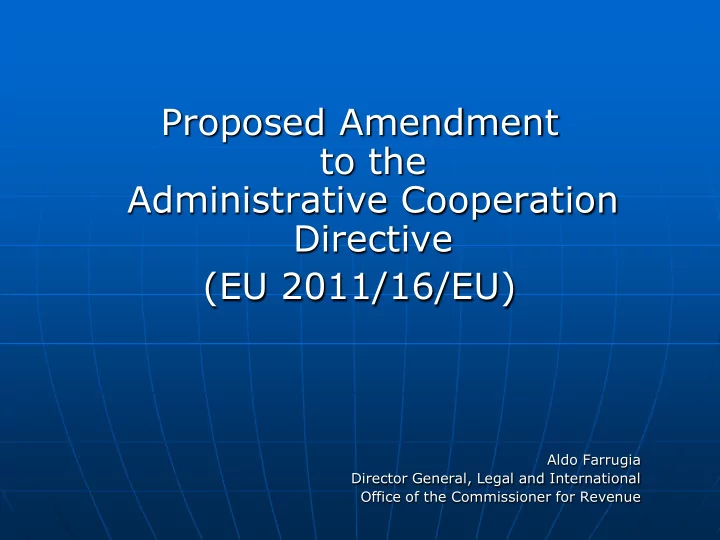

Proposed Amendment to the Administrative Cooperation Directive (EU 2011/16/EU) Aldo Farrugia Director General, Legal and International Office of the Commissioner for Revenue
New Commission Proposal Proposal issued on 12 th June 2013 Full name: Proposal for a Council Directive amending Directive 2011/16/EU as regards mandatory automatic exchange of information in the field of taxation Purpose: To extend Automatic Exchange of Information (AEOI) to a wide range of income sources
Contents of Presentation What is AEOI? History of AEOI Present Instruments concerning AEOI The New Proposal
AEOI (What it involves - 1) Involves the systematic and periodic transmission of bulk taxpayer information by the source country concerning categories of income Information that is collected in the source country on a routine basis is reported by the payer (or other entity) to the taxpayer’s source country tax authority for onward transmission to the residence country tax authority
AEOI (What it involves - 2) Information can be used to verify that taxpayers have accurately reported their foreign source income Information on acquisition of significant assets may help evaluate the net worth of an individual and to see if reported income reasonably supports the transaction
AEOI (The basic Process -1) The payor or paying agent collects information from the taxpayer and/or generates information itself Payer or paying agent reports information to its tax authorities Tax authorities consolidate information by country of residence Information is encrypted and bundles are sent to residence country tax authorities
AEOI (The basic Process - 2) Information is received and decrypted by residence country tax authorities Residence country feeds relevant information into an automatic or manual matching process Residence country tax authorities analyses the result and takes compliance action as appropriate
History of AEOI (1) Major step towards transparency was accomplished in 2009 when information exchange upon request become the international standard Now there is another step change in international tax transparency driven by developments around the globe (most notably by the US FATCA), with increasing political support for AEOI In April 2013: A Pilot Project was announced - • Ministers of Finance of France, Germany, Italy, Spain and the UK announced their intention to exchange FATCA-type information amongst themselves • 18 countries have since joined the initiative plus Britain’s Overseas Territories and Crown Dependencies
History of AEOI (2) In June 2013 the G8 leaders welcomed the OECD report “A step change in tax transparency” which sets out the concrete steps that need to be taken to put a global model of automatic exchange into practice On 5 September 2013 G20 Leaders meeting in St. Petersburg committed to automatic exchange of information as the new global standard
Current Global Context European Savings Directive • Interest income reported by financial institutions is shared between EU Member States Nordic Convention FATCA • US reporting provisions will require foreign financial institutions to provide information about world wide income and assets of US persons • Has generated support for automatic exchange between governments through an intergovernmental agreement
The EU and AEOI Savings Directive (+ proposed amendments) Administrative Cooperation Directive: from 2015 AEOI on 5 categories of income and capital (if available) – • Income from employment • Directors’ fees • Life insurance products • Pensions • Ownership of and income from immovable property
The New Proposal Reasons cited by EU Commission for Proposal Intense new drive to clamp down harder on tax evasion by Member States Any measure needs to be coordinated Negotiation of FATCA agreements with US triggers Most Favoured Nation clause in Administrative Cooperation Directive Fair and neutral approach to all different types of assets.
Contents of Proposal (1) Explanatory Memorandum • Context of Proposal • Results of Consultations • Legal Elements of the Proposal • Budgetary Implications
Contents of Proposal (2) Four Articles • Article 1: Proposed changes to Article 8 of Directive 2011/16/E (including removal of threshold) • Article 2: Proposed adoption/publishing by 31 st December 2014 Applicable from 1 st January 2015
Contents of Proposal (3) • Article 3: Proposed entry into force of 20 th day following publication of Directive in Official Journal • Article 4: Directive is addressed to Member States
What is being Proposed Extends AEOI to – • dividends, • capital gains, • any other income generated with respect to the assets held in a financial account, • any amount with respect to which the financial institution is the obligor or debtor, including redemption payments • Account balances Removes condition of “availability” for these items.
Scope of AEOI within EU with new Proposal Current Savings Revised Savings Current Admin. Revised Admin. Directive Directive Coop. Directive Coop. Directive Since 1/7/2005 From 1/1/2015 From 1/1/2015 (if available) Interest income Distributions of Income from Dividends all investment employment funds that invest Sales proceeds Capital gains in debt claims on debt claims Directors’ fees Any other income Income from Distributions of Pensions generated with innovative UCITS that invest respect to the financial in debt claims assets held in a Life insurance instruments that financial account products not are substantially covered by other similar to debt EU laws on Any amount with claims exchange of respect to which information the financial Income from life institution is the insurance obligor or debtor, Ownership of and products that are including income from substantially redemption immovable property similar to debt payments claims Account balances
Reaction from Member States Member States (MS) met a number of times to discuss MS concerns: • lack of detail in Proposal • Ensuring alignment with other AEOI initiatives in order to avoid extra costs for business and tax administrations MS generally want one system for AEOI MS generally prefer that OECD takes lead but agree that EU to take important role in discussions within OECD EU Presidency submitted concerns to OECD
Thank You For Your Attention
Recommend
More recommend